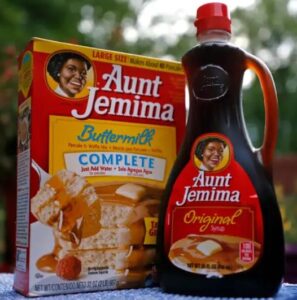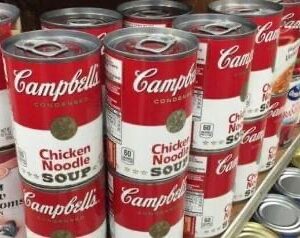The great-grandson of the original Aunt Jemima expressed his rage that cancels culture is erasing her heritage after Quaker Foods unveiled its rebranding.
As we revealed, the brand will be rebranded after Quaker Foods gave in to pressure to “cancel” Aunt Jemima. The genuine Aunt Jemima’s great-grandson, Anna Short Harrington, is now speaking out to express his outrage and disappointment over the erasure of her legacy.

The “Aunt Jemima” Anna Short Harrington’s Great-Grandson Speaks Out
“This is unfair to my family and me. My history includes this, sir,” Larnell Evans Sr. said to Patch. “The racism they allege comes from the other side, from white people, as seen by their use of pictures from enslavement.”
Nancy Green, a former slave, debuted the first “Aunt Jemima” in 1893 at the Chicago World’s Fair. Cook Green was employed on the city’s South Side. She was paid to serve pancakes to fairgoers while donning an apron and a headscarf.
Her portrayal of “Aunt Jemima” lasted until her passing in 1923. Evans claimed that Anna Short Harrington, his grandmother, took over after that.
Uses for Quaker Foods Likeness of Anna Short Harrington
Members of the fraternities at Syracuse University, where Harrington worked as a chef, praised her pancakes. During the 1935 New York State Fair, she distributed homemade pancakes when a Quaker Foods employee came across her.
She was employed by Quaker Foods right once, and the company utilized her image in advertisements and on products. Harrington was also sent all across the country to serve pancakes while dressed as “Aunt Jemima,” turning her become a household name.
She spent 20 years working for the Quaker Oats company. As Aunt Jemima, she made pancakes for people all over the United States and Canada, according to Evans.
“It was after slavery, and this woman serviced all those people. Working as Aunt Jemima, she. That was what she did. How do you think I feel about sitting here telling you about my family’s history, which they are attempting to obliterate, as a black man?
According to Evans, a 66-year-old disabled U.S. Marine veteran, Quaker Foods also employed Harrington’s pancake recipe. Her heirs attempted to sue the business for $3 billion for failing to pay them royalties in 2014, but they were unsuccessful.
Evans goes all in.
Evans argued that rather than entirely removing the photographs from stores, Quaker Foods should acknowledge that they made money from the likenesses of Green and Harrington and images of slavery.
He asked, “How many white people were raised watching cartoons like Aunt Jemima at breakfast daily? How many white businesses generated huge profits while giving us nothing? I believe they ought to examine it. They cannot simply eradicate it while we continue to suffer.”
“They’re just going to erase history as if it never happened after making all that money—and now that backers are demanding restitution for slavery?” Evans continued. “They won’t offer us anything, right? What grants them this authority?”
However, Quaker Foods has stated that by the end of the year, all products will no longer feature Aunt Jemima branding or artwork.






